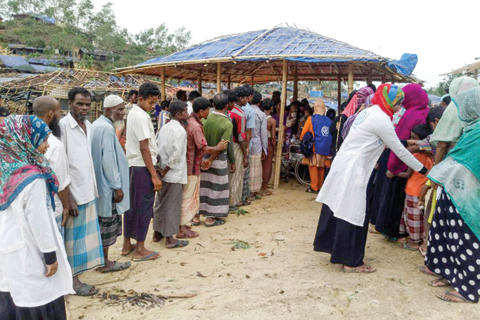Indian navy plucks 33 cyclone survivors, body, from sea

COX'S BAZAR: An IOM medical team provides treatment at Balukhali camp yesterday. - AFP
COX'S BAZAR, Bangladesh: Aid workers warned yesterday of an "acute crisis" in Bangladesh after a cyclone destroyed thousands of homes and devastated camps housing Rohingya refugees, leaving many without food or shelter. Hundreds of thousands of Rohingya live in the overcrowded camps in Cox's Bazar on the southeast coast after fleeing violence in neighboring Myanmar. Cyclone Mora battered the area on Tuesday, killing seven people, destroying 20,000 homes and forcing the evacuation of 600,000 residents.
India's Navy said it had pulled 33 Bangladeshi survivors and a body from the Bay of Bengal Wednesday during search and rescue operations following the cyclone. Some of the worst damage was at the camps housing the 300,000 Rohingya, whose numbers swelled last year following a military crackdown on the stateless Muslim minority in Myanmar. "There is an acute crisis of food, shelter, health services, water and sanitation facilities in the makeshift settlements following the storm," said Sanjukta Sahany, local head of the International Organization for Migration which coordinates relief in some of the camps. "The drainage and toilet system have been fully broken," she told AFP.
Risk of disease
Sahany said the storm had destroyed or damaged at least 16,010 homes in the makeshift camps and also seriously damaged clinics run by aid agencies for the Rohingya and the local community. Aid workers scrambled to get food to the camps, which house around 300,000 Rohingya, many of whom were observing the Ramadan fast when the cyclone struck. "We are also repairing community structures and schools so that families that are sleeping in the open can move inside until their sheds can be repaired," said John McKissick, who heads the Cox's Bazar office of the UN refugee agency, UNHCR.
Refugees have said they were given no official warning of the storm and were unable to salvage stockpiles of food for the breaking of the fast when it hit. "No charities came to offer food. Some people shared a small piece of bread between a group of four," community leader Mohammad Rafique Habib told AFP. "Pregnant women, children and the elderly are suffering most." Abdul Matin, who lives in a camp for unregistered Rohingya refugees, told AFP many had crowded into schools and mosques for the night, while others were forced to sleep in the open.
Haji Abdus Salam, who lives in Nayapara camp with his 13 children, two wives and 10 grand-children, said the family had not eaten since Tuesday. Outside the camps, Bangladeshi authorities say 20,000 homes were destroyed and another 39,000 damaged by the cyclone, which brought winds of up to 135 km per hour. The charity Save the Children said it was particularly concerned about the impact on minors. "Making matters worse, there is also an increased risk of disease, especially for those living in temporary or basic housing and with poor water and sanitation facilities," said country director Mark Pierce.
Bangladesh had earlier evacuated nearly 600,000 people from vulnerable areas and many low-lying villages were inundated by a storm surge reaching four feet (1.3 m). Most have since returned to their homes. Prime Minister Sheikh Hasina told parliament her government's swift response, coupled with the fact that the cyclone made landfall during an ebb tide, had averted disaster. Hasina has said her government would rebuild all property damaged by the storm and has sent two Bangladesh Navy ships to two of the worst-hit areas.
It was not immediately clear how the 33 rescued yesterday came to be in the sea, although some reports said they may have been swept from the shore. The Fishing Boat Association said an estimated 200 fishermen had failed to return to port. They were thought to be stranded, or to have anchored, on far-flung islands.
The INS Sumitra found the survivors, including women and children, floating in the Bay of Bengal roughly 160 km off the coast of Chittagong. "Our navy have found 33 survivors and one dead body from the sea. They were floating in the waters when they were found," Dhaka's Indian High Commission spokesman Ranjan Mondol said. The Indian embassy's Facebook page showed pictures of survivors floating in the Bay of Bengal as well as of rescued people covered in blankets.
Eastern Naval Command spokesman Commander C G Raju said the rescued Bangladeshis were given medical treatment. "We are planning to send a rescue aircraft to look out for more survivors," he told AFP. The Indian Navy had reportedly kept its Eastern Fleet on the highest alert level to assist Bangladesh if needed. Cyclone Mora comes after heavy rains in Sri Lanka caused the worst flooding the island has seen in well over a decade, killing more than 200 people. South Asia is frequently hit by flooding in the summer with the arrival of the annual monsoon rains. - AFP










